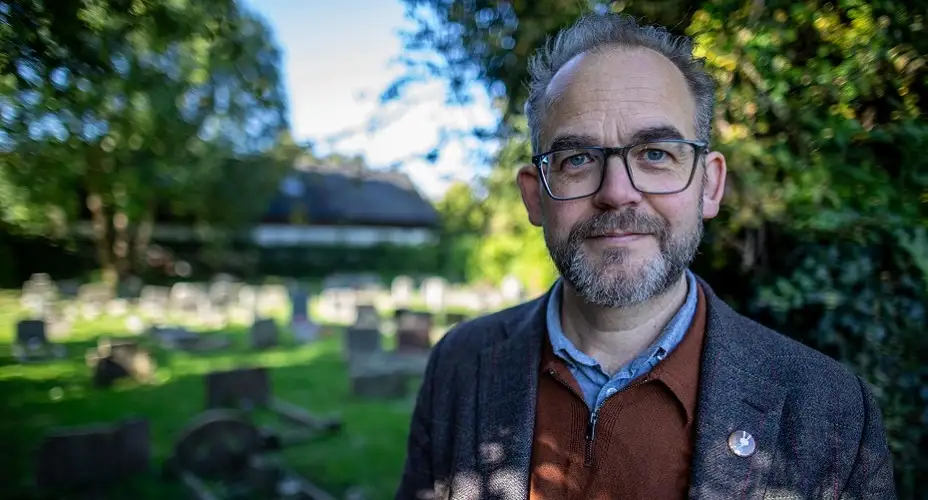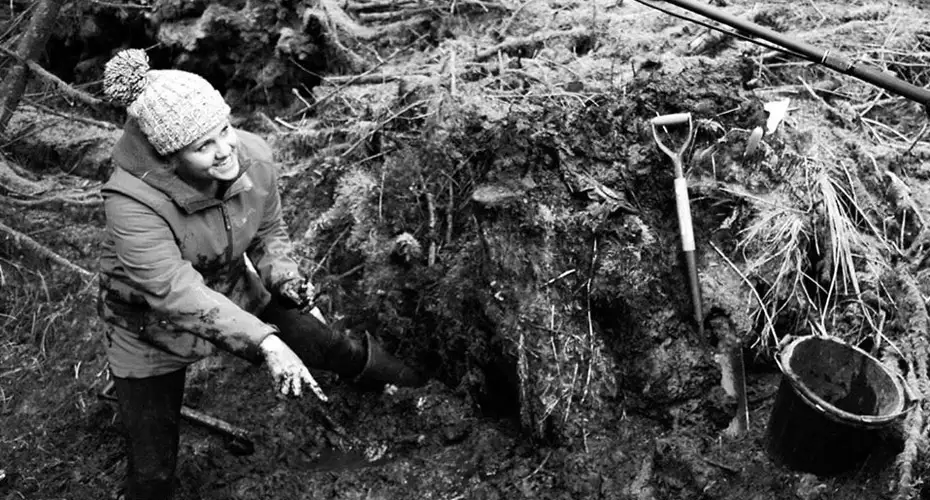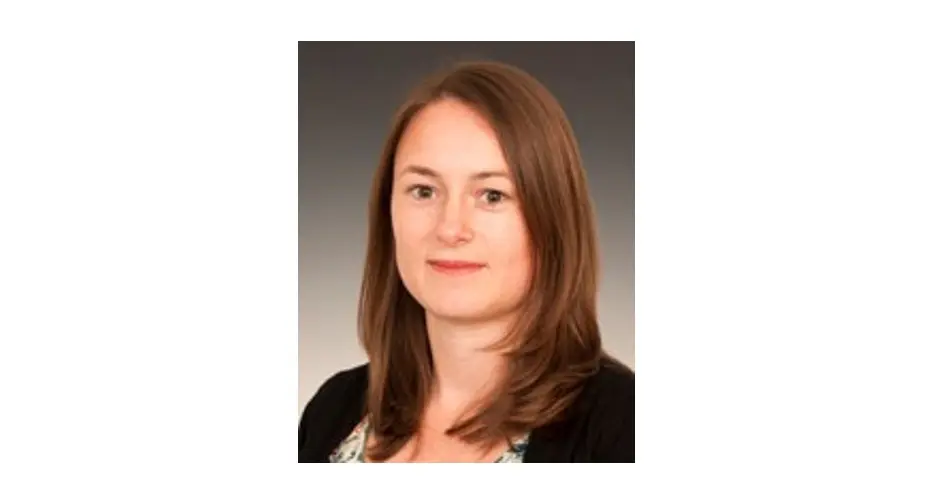Masters applications for 2025 entry are now closed.
Applications for September 2026 will open on Wednesday 24 September. Applications are now open for programmes with a January 2026 start. View our programmes »
| UCAS code |
|
| Duration |
1 year full time
2 years part time |
| Entry year |
September 2026 |
| Campus |
Streatham Campus
|
| Discipline |
Archaeology
|
| Contact |
|
Overview
- Gain an in-depth understanding of the scientific principles and practices essential for forensic investigations
- Develop competence and knowledge through immersive skills-based engagement activities and modules
- Learn with an interdisciplinary team who combine expertise from different academic and industry areas
- This MSc prepares you to excel in the forensic science sector and other related fields
Top 50 in world subject rankings for Archaeology
Top 10 in the UK for Archaeology and Forensic Science
Top 10 in the Complete University Guide 2026
Commitment to interdisciplinary teaching and research
Top 50 in world subject rankings for Archaeology
Top 10 in the UK for Archaeology and Forensic Science
Top 10 in the Complete University Guide 2026
Commitment to interdisciplinary teaching and research
Entry requirements
We will consider applicants with a 2:2 Honours degree or above in a social science* or humanities subject, biology, chemistry, heritage or environmental science. While we normally only consider applicants who meet this criteria, if you are coming from a different academic background which is equivalent to degree level, or have relevant work experience, we would welcome your application.
For applicants from different academic backgrounds or with relevant work experience, please use your Personal Statement to provide additional information. This might include:
- Why you want to study this course at the University of Exeter and what personal qualities make you suitable for postgraduate study.
- Relevant background (work/degree experience).
- Lecturers/modules you are particularly interested in and why.
- Career/future ambitions and how the course will help you achieve them.
Feel free to informally contact the Programme Director (see above) for advice before submitting your formal application.
*Accepted social science subjects include:
- Anthropology
- Archaeology
- Area and Development Studies
- Criminology
- Demography
- Development Studies
- Economics
- Economic and Social History
- Education
- Environmental Planning
- Human Geography
- International Relations
- Law
- Linguistics
- Management and Business Studies
- Media and Communication Studies
- Philosophy
- Politics and International Studies
- Psychology
- Science and Technology Studies
- Social Policy
- Social Statistics, Methods, and Computing
- Social Work
- Socio Legal Studies
- Sociology
Please also see our guidance on essential documentation required for an initial decision on taught programme applications.
Entry requirements for international students
Please visit our entry requirements section for equivalencies from your country and further information on English language requirements.
Read more
Please also see our guidance on essential documentation required for an initial decision on taught programme applications.
Entry requirements for international students
English language requirements
International students need to show they have the required level of English language to study this course. The required test scores for this course fall under Profile B1. Please visit our English language requirements page to view the required test scores and equivalencies from your country.
Course content
This MSc combines hands-on practical work with theoretical studies, allowing you to develop your skills using advanced laboratories and cutting-edge analytical tools. By the end of the course, you will be able to critically analyse evidence, create strategic solutions for operational challenges, conduct original research, and communicate complex scientific findings effectively.
The programme is divided into units of study called modules which are assigned 'credits'. The credit rating of a module is proportional to the total workload, with 1 credit being nominally equivalent to 10 hours of work.
The modules we outline here provide examples of what you can expect to learn on this degree course based on recent academic teaching. The precise modules available to you in future years may vary depending on staff availability and research interests, new topics of study, timetabling and student demand.
1-year, 1-stage 180 credits -
Stage 1: 150 credits of compulsory modules and 30 credits of optional modules.
Compulsory modules
| Code | Module |
Credits |
|---|
| ARCM701 |
Independent Project: Interpretation, Evaluation and Presentation of Evidence | 30 |
| ARCM702 |
Laboratory Analysis | 30 |
| ARCM703 |
Crime Scene Investigation | 30 |
| ARCM704 |
Forensic Anthropology | 30 |
| ARCM705 |
Forensic Archaeology | 30 |
Optional modules
| Code | Module |
Credits |
|---|
| ARC3510 |
Experimental Approaches to Forensic and Archaeological Investigations | 15 |
| ARCM407 |
Zooarchaeology | 15 |
| HISM043 |
Critical Approaches to the History of Violence and Conflict | 30 |
| POLM231 |
State Crime | 30 |
| ARCM412 |
Funerary Osteoarchaeology | 15 |
| ANTM109 |
Animal Criminology | 15 |
| ARA3045 |
War, Violence and Revolution in the Modern Middle East | 30 |
| ARCM415 |
The Archaeology of Humans and Other Animals | 15 |
| ARCM130 |
Discovering the Past with Molecular Science | 15 |
| CRI3013 |
Introduction to Terrorism Studies | 15 |
| SPAM003 |
Computational Social Science 1 | 15 |
| SPAM004 |
Computational Social Science 2 | 15 |
| HASM026 |
Research Skills in Archaeology and History | 15 |
Year 1
Year 1: 90 credits of compulsory modules.
Compulsory modules
| Code | Module |
Credits |
|---|
| ARCM702 |
Laboratory Analysis | 30 |
| ARCM703 |
Crime Scene Investigation | 30 |
| ARCM705 |
Forensic Archaeology | 30 |
Year 2
Year 2: 60 credits of compulsory modules and 30 credits of optional modules.
Compulsory modules
| Code | Module |
Credits |
|---|
| ARCM701 |
Independent Project: Interpretation, Evaluation and Presentation of Evidence | 30 |
| ARCM704 |
Forensic Anthropology | 30 |
Optional modules
| Code | Module |
Credits |
|---|
| ARC3510 |
Experimental Approaches to Forensic and Archaeological Investigations | 15 |
| ARCM407 |
Zooarchaeology | 15 |
| HISM043 |
Critical Approaches to the History of Violence and Conflict | 30 |
| POLM231 |
State Crime | 30 |
| ARCM412 |
Funerary Osteoarchaeology | 15 |
| ANTM109 |
Animal Criminology | 15 |
| ARA3045 |
War, Violence and Revolution in the Modern Middle East | 30 |
| ARCM415 |
The Archaeology of Humans and Other Animals | 15 |
| ARCM130 |
Discovering the Past with Molecular Science | 15 |
| CRI3013 |
Introduction to Terrorism Studies | 15 |
| SPAM003 |
Computational Social Science 1 | 15 |
| SPAM004 |
Computational Social Science 2 | 15 |
| HASM026 |
Research Skills in Archaeology and History | 15 |
Fees
2026/27 entry
UK fees per year:
£12,650 full-time; £6,325 part-time
International fees per year:
£25,550 full-time; £12,775 part-time
Scholarships
The University of Exeter offers a wide range of scholarships to support your education, with £7 million available for international students applying to study with us in the 2026/27 academic year, including our prestigious Exeter Excellence Scholarships *. We also provide awards for sport, music and other achievements, as well as regional and partner scholarships with organisations such as Chevening, The Beacon Trust and the British Council. For more information on scholarships and other financial support, please visit our scholarships and bursaries page.
University of Exeter Alumni Scholarship
We are pleased to offer University of Exeter alumni beginning a standalone postgraduate programme in 2026/27 with us a scholarship towards the cost of your tuition fees. Full details can be found here.
*Terms and conditions, including deadlines, apply. See our website for details..
Teaching and research
Learning and teaching
We seek to inspire and educate students in stimulating ways so as to develop intellectual skills for life and employment in the contemporary world. Skill gain and tailored immersive engagement are central tenets of the programme’s design, with learning enhanced through practical exercises and progression captured through portfolio and skill-based assessments.
Teaching team
We believe in “no borders” interdisciplinary collaboration, a particularly essential attribute for forensic casework. Given the nature and scope of criminal activity, a vast array of expertise is required to identify, record, and reconstruct events accurately. We therefore operate a collaborative cross-disciplinary team from across the university and industry, drawing a wide range of expertise into the delivery of this MSc.
Classes
Most of the formal classes that you will attend will be a mixture of lectures, seminars, workshops, and laboratory sessions. The precise mix will vary between modules. These aim to outline the principal issues of the module, to explore some detailed issues, and, where relevant, to give you experience of working with a particular technique or data set.
Assessment
The assessment for the MSc Forensic Investigations is through a combination of tests, essays, reports, posters, portfolios, oral and visual presentations, viva voce, and an independent project. The independent project of up to 10,000 words is a substantial piece of original and independent research on a topic aligned to career aspirations or research interests, subject to the approval of a supervisor.
Engagement
All members of staff are actively engaged in research and casework, both in Britain and abroad, regularly attending conferences, workshops and symposia. It is through this engagement in both academia and industry that the university are able to provide top quality teaching by experts in their field.
Lab
In addition to the facilities below, you will have access to our Science Heritage and Archaeology Digital (SHArD 3D) Lab which includes equipment for: advanced digital microscopy, x-ray imaging and micro-CT imaging, and 3D modelling capabilities utilising structured light scanners for both small objects and entire landscapes. We also have a portable XRF for elemental analysis, and two drones for aerial survey and landscape modelling.
The SHArD Lab also provides you with the opportunity to collaborate and network with its commercial forensic partners and clients.
Facilities
As a member of the Archaeology and History Department and key part of our Postgraduate community you will have full access to our exceptional, modern facilities and resources. These include:
- Dedicated Experimental Archaeology laboratories and workshop spaces.
- Clean lab with fume cupboards for chemical work.
- Microscope room equipped with high specification microscopes and image processing facilities
- Wet labs for sample processing
- State of the art surveying equipment which includes resistivity equipment, magnetometers, differential and hand-held GPS, and a total station theodolite.
Collections
We also have extensive reference collections of artefacts, animal bones and plant remains. You will also have access to the wider resources of the University too, including the Library, Special Collections and our Digital Humanities Lab.
Read more
Facilities
As a member of the Archaeology Department and key part of our postgraduate community you will have full access to our exceptional, modern facilities.
• Experimental Archaeology Labs
• Bioarchaeology Lab
• Clean Lab and fume cupboards for preparing stable isotope samples
• Landscape archaeology project office
• Microscope room equipped with high specification microscopes and image processing facilities
• Digital Humanities Lab
• Wet labs for artefact and environmental sample processing
• Digital x-ray facilities and equipment for elemental analysis
• State-of-the-art surveying equipment
• Outdoor experimental space
SHArD 3D Laboratory
The University of Exeter's Science, Heritage and Archaeology Digital 3D (SHArD 3D) Laboratory, is a state-of-the-art facility dedicated to digitally replicating and preserving biological and cultural artefacts. Funded by nearly £893,000 from the Arts and Humanities Research Council (AHRC), SHArD 3D employs advanced scanning and microscopy techniques to create detailed 3D models, enhancing the study of archaeological finds and bio-cultural heritage.
This cutting-edge laboratory offers students unparalleled opportunities to engage with the latest digital preservation technologies, including portable 3D scanning equipment for fieldwork and a microCT scanner for non-destructive imaging of artefacts. Collaborations with institutions like Exeter’s Royal Albert Memorial Museum will further enrich the learning experience, providing practical skills in digital archiving and analysis.
By studying Archaeology at the University of Exeter, students will be at the forefront of innovative research methods, preparing them for dynamic careers in heritage preservation and forensic analysis.
Learn more about our facilities
Collections
On top of all that we also have extensive reference collections of artefacts, animal bones and plant remains. So whatever your specific interests within archaeology we have the kit for it.
And of course you will have access to the wider resources of the University too, including the Library and Special Collections.
Read more

Professor Karl Harrison
Professor of Practice in Forensic Investigation

Dr Laura Evis
Senior Lecturer in Forensic Archaeology and Anthropology

Dr Sophie Beckett
Lecturer in Archaeology
Professor Karl Harrison
Professor of Practice in Forensic Investigation
Professor Karl Harrison has worked in the field of forensic investigations for over 20 years. He is a former National Forensic Specialist Adviser and one of the most experienced Forensic Archaeologists currently operational. Most of his casework has been UK-based and focused on prosecution work with UK police forces, but he has in addition worked internationally in Portugal, Greece, Poland, Iraq and in international waters. Focused on forensic archaeology, Karl has a broad background in scene forensics and major scene coordination, and has provided forensic strategy advice across a range of complex major investigations. Commended for his work at Grenfell Tower, Karl has a particular interest in the intersection between forensic investigation and mass fatality procedure.
Profile page
Dr Laura Evis
Senior Lecturer in Forensic Archaeology and Anthropology
Dr Laura Evis is a forensic bioarchaeologist who adapts and applies various archaeological and anthropological techniques to help answer questions and solve problems for medico-legal investigations. Topics of interest include the development of specialist search, location, recovery and recording methods for forensic casework, including work conducted in domestic, international and mass disaster settings. Laura's previous research focused on experimentally testing existing archaeological excavation techniques and recording methods to validate their suitability for use in forensic casework. Laura teaches across a range of subjects, but specialises in forensic archaeology and anthropology.
Profile page
Dr Sophie Beckett
Lecturer in Archaeology
Dr Sophie Beckett is a lecturer in Archaeology at the University of Exeter.
Research interests span Human Osteoarchaeology, Forensic Anthropology and Applied Archaeological Science with particular focus on biological minerals (such as dental calculus, urinary stones and burnt bone), disarticulated human skeletal remains, osteometrics and, the application of computed tomography (CT) and X-ray diffraction (XRD) analysis within Archaeology. Sophie is an Honorary Fellow of Melbourne Dental School (University of Melbourne) and a Chartered Chemist (Royal Society of Chemistry). She has experience of management of large multi-user laboratories, commercial analysis in XRD and CT and, working in the UK and abroad within mass fatality incident response.
Profile page
Careers
This programme prepares you to excel in the forensic science sector and various other related fields. The MSc has been designed to align with the latest industry standards.
The interdisciplinary nature of the programme provides a range of employment options both within and outside of the forensic science sector, as well as progression opportunities to study a PhD.
Example fields where graduates find employment:
- Police
- Military
- Crime Scene Investigation
- Fire and Rescue Service
- Forensic Service Provision (Private) Laboratories and Scene Support
- Government Laboratories (e.g., CAST or DSTL)
- Medical Laboratories
- Medical Sector (NHS; Doctors; Mortuary Technicians)
- NGOs/IGOs (e.g., Red Cross; Human Rights Watch; Amnesty International; International Commission on Missing Persons)
- Emergency Response
- Heritage (Museums; Commercial Archaeology)
- Law (Barristers; Solicitors)
- Project Management
- Academia (PhD; Research; Lectureships)
Developing your skills and career prospects
Employment and professional development:
Our excellent Career Zone provides invaluable support, advice and access to graduate employers. Visit the employment and professional development pages for more information, including podcasts and profiles, about the range of support available.














